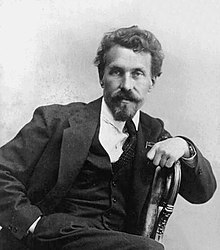Alexei Rykov
| Alexei Rykov Алексей Рыков |
|
|---|---|
 |
|
| Chairman of the Council of People's Commissars of the Soviet Union | |
|
In office 2 February 1924 – 19 December 1930 |
|
| Preceded by | Vladimir Lenin |
| Succeeded by | Vyacheslav Molotov |
| Chairman of the Council of People's Commissars of the Russian SFSR | |
|
In office 2 February 1924 – 18 May 1929 |
|
| Preceded by | Vladimir Lenin |
| Succeeded by | Sergei Syrtsov |
| Chairman of the Council of Labor and Defense | |
|
In office 19 January 1926 – 19 December 1930 |
|
| Preceded by | Lev Kamenev |
| Succeeded by | Vyacheslav Molotov |
| Full member of the 11th, 12th, 13th, 14th, 15th, 16th Politburo | |
|
In office 3 April 1922 – 21 December 1931 |
|
| Member of the 10th, 11th, 12th Orgburo | |
|
In office 16 March 1921 – 2 June 1924 |
|
| Personal details | |
| Born |
Alexei Ivanovich Rykov 25 February 1881 Saratov, Russia |
| Died | 15 March 1938 (aged 57) Moscow, Soviet Union |
| Nationality |
Russian (1881–1938) Soviet (1922–38) |
| Political party | All-Union Communist Party (bolsheviks) (1925–38) |
| Children | Natalia Alekseevna Rykova (born 1917) |
| Signature | |
Alexei Ivanovich Rykov (Russian: Алексе́й Ива́нович Ры́ков; IPA: [ɐlʲɪˈksʲej ɪˈvanəvʲɪtɕ ˈrɨkəf]; 25 February 1881 – 15 March 1938) was a Russian Bolshevik revolutionary and a Soviet politician most prominent as Premier of Russia and the Soviet Union from 1924 to 1929 and 1924 to 1930 respectively.
Rykov joined the Russian Social Democratic Labour Party in 1898, and after it split into Bolshevik and Menshevik factions in 1903, he joined the Bolsheviks—led by Vladimir Lenin. He played an active part in the 1905 Russian Revolution. Months prior to the October Revolution of 1917, he became a member of the Petrograd and Moscow Soviets, and was elected to the Bolshevik Party Central Committee in July–August of the same year, during the Sixth Congress of the Bolshevik Party. Rykov, a moderate, often came into political conflict with Lenin and more radical Bolsheviks, but nonetheless proved influential when the October Revolution finally did overthrow the Russian Provisional Government, and as such served many roles in the new government, starting October–November (old style) as People's Commissar for Internal Affairs on the first roster of the Council of People's Commissars (Sovnarkom), which was chaired by Lenin.
...
Wikipedia
